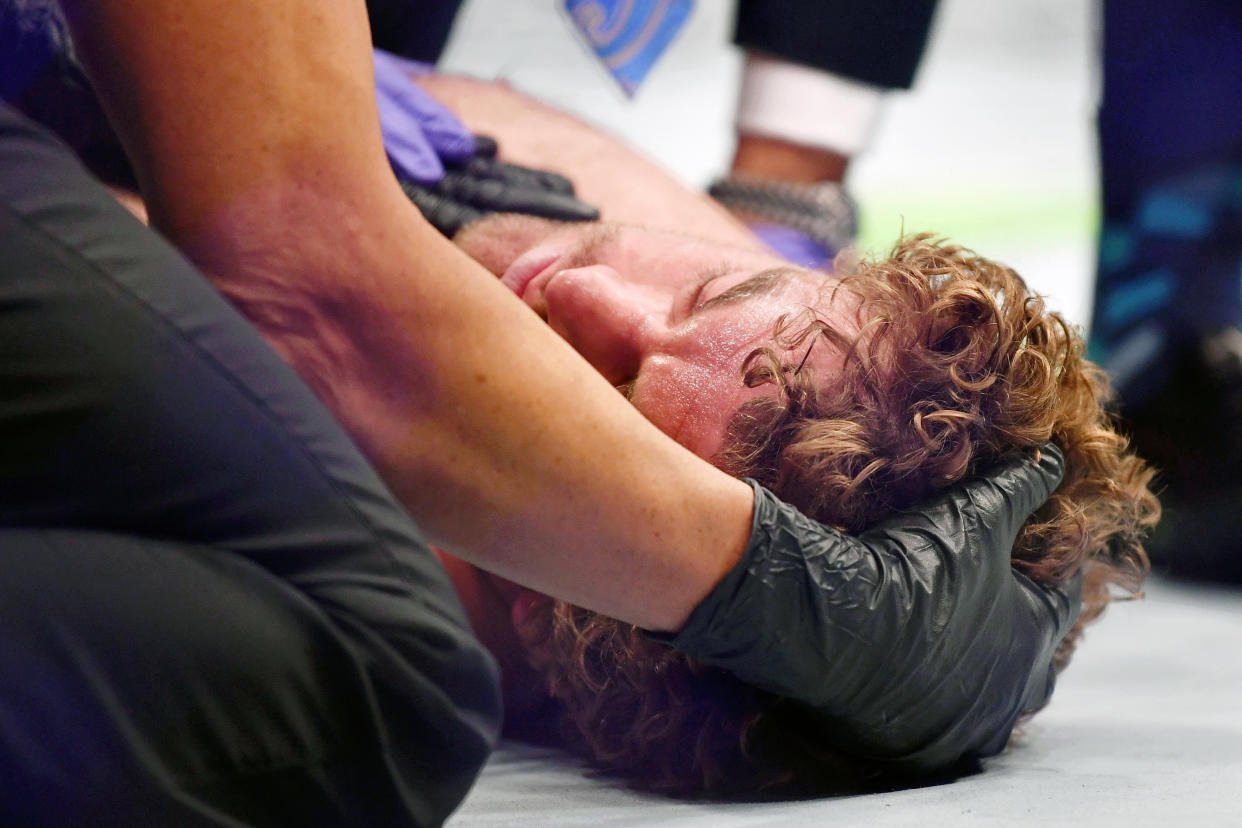Is Ben Askren fighting too soon after fighting on for too long?

Three months after being on the wrong end of one of the worst knockouts in recent MMA history, Ben Askren (19-1) fights again on Saturday. The former Olympian will face Demian Maia (27-9) in the main event of the UFC’s Singapore card (8 a.m. ET, ESPN+) and though in a vacuum the matchup is a fascinating one to consider because of the two fighters’ contrasting grappling styles, we’re remiss if we don’t at least question whether or not Askren should be fighting again so soon.
After any fight and before their next, every fighter needs time to rest and then time to train. They need lots of both, to have any chance of being healthy.
Training is where and when most of the damage a fighter absorbs is taken. That work, where joints are ground down and the brain is rattled, is occluded from view of fans who then end up implicitly viewing the yet grueling competitions themselves as the only “work” done by fighters.
Askren was knocked out by Jorge Masvidal in July and will now fight about three months later. At Askren’s level, it isn’t uncommon for fighters to have training camps for specific bouts that last three months.
This means that he either didn’t rest much after the brutal KO or that he didn’t have that long of a training camp. Either of those cases are worrisome.
Heading into a training camp too soon after brain trauma isn’t healthy. Walking into a fight with too little training isn’t always the best idea, either.
After getting knocked out by Masvidal, Askren was issued a medical suspension that ordered him to have “no contact” until Aug. 21 and that overall suspended him from competition until Sept. 5. So, just over the minimum has been done for Askren in that regard.

Perhaps the most significant piece of this discussion of Askren’s health as he rushes back into the ring after his first ever pro defeat and a grizzly knockout is that it’s happening years after Askren retired, citing concern for his own long-term neurological health. Before coming out of retirement in 2019 to fight for the UFC, Askren announced in the fall of 2017 that he was deciding to hang up his gloves. His stated reasons were two-pronged.
Askren felt that he should give up the “selfish” pursuit of his own athletic career to give more back to his family and students. Second, Askren wisely understood that most fighters fight on for too long, and are inevitably diminished in the ring and – more importantly – in terms of their health.
“Nobody retires in time,” he told The MMA Hour, at the time.
“I mean, you think about who retires during their prime, the number of athletes who do that in any sport is very small. And obviously a sport like golf, where you see Tiger Woods fall off – well, there’s not really too much damage he could take from that, right? Although when you watch him and he sucks, and you’re like, ‘God, he used to be so good, but you suck now,’ it’s kind of disconcerting as a fan, right? But then you look at someone like Muhammad Ali, who was literally my favorite athlete of all-time. The punishment he took from sticking around too long past his prime, man, I would have to say – we can’t prove it, but I’d have to say we could guess it led to a lot of the problems that he had later in his life.”
Even two years ago Askren realized that he was past his physical prime, and so decided that it would be the smartest choice for him to stop sustaining the damage of training camps and fights. “We’re in a combat sport. It’s dangerous, and I am definitely not physically at the peak I was, say, four to five years ago,” he explained, in 2017.
“It’s a slippery slope because, can I still compete with the best in the world? Yeah, of course I can. But you start getting a little worse and a little worse, a little worse. When is the cutoff?”
Askren himself encapsulated the concern of this column well, back then. This isn’t an argument about his potential for efficacy in the ring — this is written out of concern for the long-term neurological damage fighters suffer and which we all too often ignore.
Askren may very well fight effectively and win this weekend, despite his rush back into action. Even if so, that won’t tell us anything about his long-term health as a result of a long career in combat sports, at the end of which he fought longer than he planned, and quickly after getting concussed.
More from Yahoo Sports:

